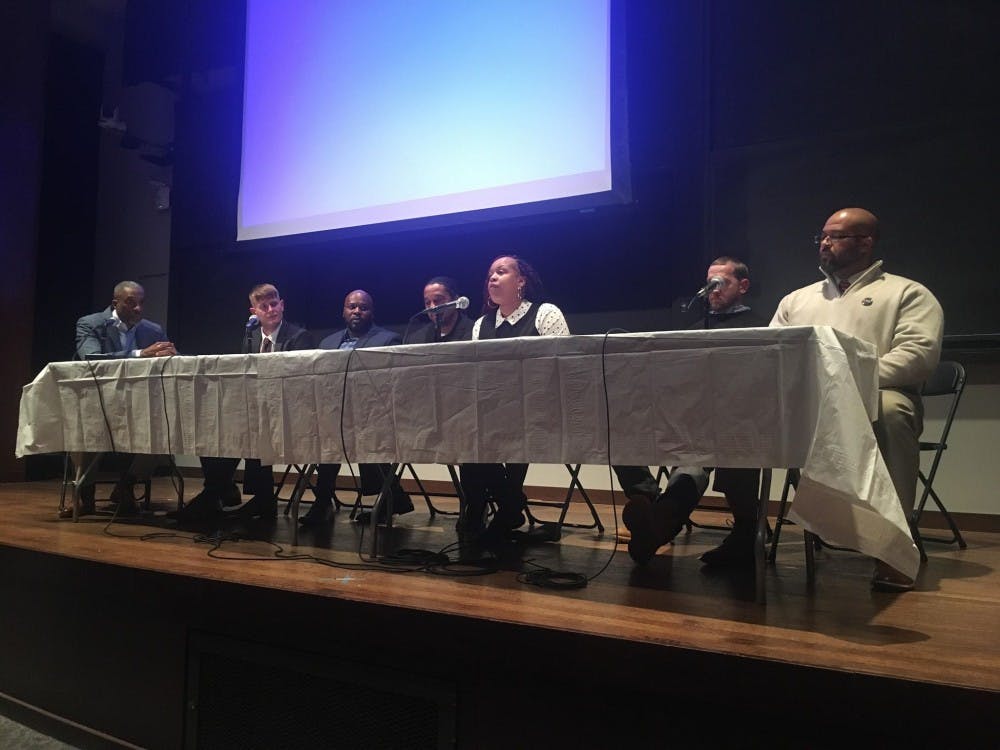In a panel discussion on the relationship between voting rights and criminal justice reform on Tuesday, March 5, Cassandra Severe, the first speaker, walked the audience through her life journey.
The trauma she experienced in her home as a child, she said, prevented her from pursuing the path that could have been hers, as she grew up in an upper middle class neighborhood in New Jersey.
“That troubled child became a troubled adult,” she said of herself.
From the age of 18 to her late twenties, Severe served several prison sentences, the last of which, in 2010, saw the birth of her son. Her son gave Severe a sense of purpose in life and a drive to turn her life around. She received a B.A. in social work from Rutgers-Newark University in 2017 and now serves in Newark Mayor Ras Baraka’s Street Team, working to reduce violence.
The reinstatement of her right to vote felt to her like “divine intervention.” Although she never felt that elected officials could understand or represent her struggles before her incarceration, she now cherishes her enfranchisement and the power it holds.
“I always take my son to vote — he needs to see what voting looks like, that your voice does matter,” she said.
Like Severe, seven other formerly incarcerated citizens-turned-activists took the stage to share their life paths and how their experiences shape the work they do now.
The event was organized by Students for Prison Education and Reform (SPEAR) as part of the organization’s Voting Rights project, led by Leila Ullman ’21.

Currently, the panelists’ work centers around S2100 (also known as A3456), a bill introduced in the New Jersey state legislature in March 2018 that would remove prohibition on voting by persons convicted of indictable offenses who are on parole, probation, or serving sentences.
Paul Kazelis, an Iraq War Combat Veteran who was incarcerated for five years as a result of a heroin addiction he developed due to undiagnosed PTSD, spoke on why he believes voting is a “basic human right.”
“I have experienced the extremes of what it means to be a citizen,” he said. “As a combat veteran, I was highly esteemed by society, and then as an incarcerated person, I essentially had my humanity stripped [from] me.”
As he watched the 2016 election, he recalled feeling “sickened” by the presidential candidates’ discussion of foreign policies, policies for which he had been willing to lay down his life but was now prohibited from voting for or against.

Antonne Henshaw served a 30-year prison sentence, during which he earned a B.A. from Rutgers University and is now the Vice President of Wo/Men Who Never Give Up, Inc. He said politicians make one thing clear: “If you don’t vote, you don’t count.”
Ron Pierce, the evening’s moderator and a Democracy and Justice Fellow at the New Jersey Institute for Social Justice, echoed Henshaw’s sentiment.
“When Congresswoman Bonnie Watson Coleman came to the prison, she wasn’t looking for votes, she came looking to listen,” said Pierce, adding that unique transformative moments like that would become a constant if politicians needed to go to prisons to seek out inmates’ votes.
Henshaw then told a personal story that, for him, most encapsulated the tie between prison and voting rights reform.
He and Ibrahim Sulamani, another ex-convict on the panel, were walking down the street when two children volunteering with a voter registration campaign told them to “vote because we can’t.” Without coordinating, both men immediately lied to the children, saying they had voted. In reality, both are, as of now, disenfranchised.
“The shame of having to lie to the little kids — that shame made me go harder for this right than ever before,” Henshaw said.
Boris Franklin, a former inmate who served 11 years in prison and is now an author and student at Rutgers University, spoke on the hypocrisy of depriving seven million tax-paying citizens of the right to vote.
“This is taxation without representation,” he said.
A recurring challenge faced by the activists seemed to be the public’s disbelief in former convicts’ redeemability.
“A lot of people just don’t believe in second chances,” said Quiana Malone, a field organizer who was involved with the passage of Florida’s Amendment 4 — state legislation that gave over a million ex-felons in Florida the right to vote. Malone joined the panel via Skype.
When asked what a world in which incarcerated citizens can vote would look like, Franklin almost laughed.
“It would just look like regular people voting,” he said. “Some people more informed, some less informed. Apparently, we have the same issue out here, too, at least based on the last election.”
Ullman hopes audience members walked away from the event with a commitment to act.
“I think it’s easy to talk, to listen, and to think,” she said. “But Princeton students really can move mountains and change policy, especially in this case, where there’s a real piece of legislation already on the table.”
The dinner talk took place in McCormick 101 at 6 p.m. and was co-sponsored by SPEAR, the University’s Program in Law and Public Affairs (LAPA), the Carl A. Fields Center for Equality, the American Whig-Cliosophic Society, and the Pace Center for Civic Engagement.








